Mitsubishi ASX vs Renault Mégane – Which model is better for everyday use?
Costs and Efficiency:
Price and efficiency are key factors when choosing a car – and this is often where the real differences emerge.
Mitsubishi ASX has a decisively advantage in terms of price – it starts at 20600 £, while the Renault Mégane costs 35100 £. That’s a price difference of around 14495 £.
Engine and Performance:
Power, torque and acceleration are the classic benchmarks for car enthusiasts – and here, some clear differences start to show.
When it comes to engine power, the Renault Mégane has a evident edge – offering 218 HP compared to 158 HP. That’s roughly 60 HP more horsepower.
In acceleration from 0 to 100 km/h, the Renault Mégane is slightly quicker – completing the sprint in 7.40 s, while the Mitsubishi ASX takes 8.50 s. That’s about 1.10 s faster.
In terms of top speed, the Mitsubishi ASX performs slightly better – reaching 180 km/h, while the Renault Mégane tops out at 160 km/h. The difference is around 20 km/h.
There’s also a difference in torque: Renault Mégane pulls slight stronger with 300 Nm compared to 270 Nm. That’s about 30 Nm difference.
Space and Everyday Use:
Beyond pure performance, interior space and usability matter most in daily life. This is where you see which car is more practical and versatile.
Both vehicles offer seating for 5 people.
In curb weight, Mitsubishi ASX is evident lighter – 1296 kg compared to 1719 kg. The difference is around 423 kg.
In terms of boot space, the Mitsubishi ASX offers slightly more room – 484 L compared to 389 L. That’s a difference of about 95 L.
In maximum load capacity, the Mitsubishi ASX performs slightly better – up to 1596 L, which is about 264 L more than the Renault Mégane.
When it comes to payload, Mitsubishi ASX hardly perceptible takes the win – 449 kg compared to 446 kg. That’s a difference of about 3 kg.
Who comes out on top?
Overall, the Renault Mégane shows itself to be has the upper hand and secures the title of DriveDuel Champion.
It convinces with the more balanced overall package and proves to be the more versatile choice for everyday use.
Costs and Consumption
View detailed analysis
Engine and Performance
View detailed analysis
Dimensions and Body
View detailed analysis
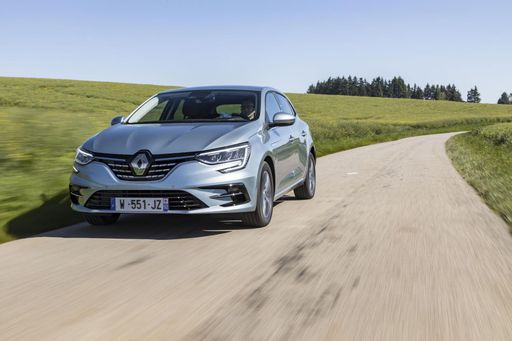 @ Renault Group Media
@ Renault Group Media
Renault Mégane
Mitsubishi ASX
The Mitsubishi ASX is a compact crossover that mixes practicality with a no-nonsense personality, making it an easy choice for buyers who want sensible space without the showroom theatrics. It won't set your pulse racing, but its composed ride and user-friendly kit make it a dependable companion for daily errands and weekend escapes — reliable rather than flashy.
details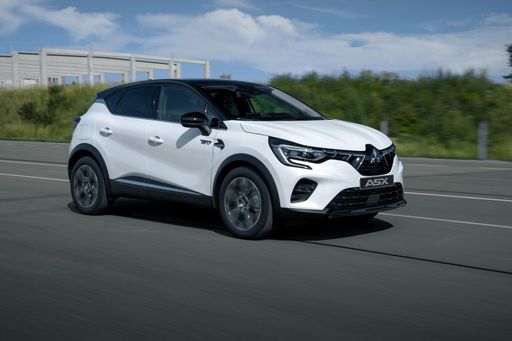 @ Mitsubishi Motors Corporation
@ Mitsubishi Motors Corporation
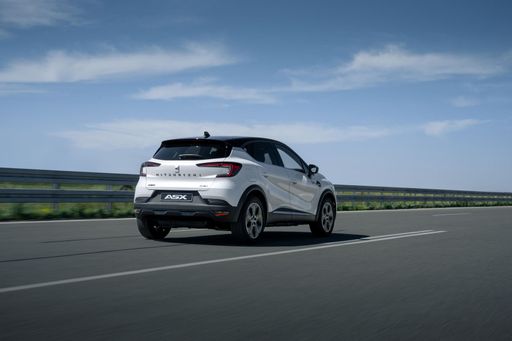 @ Mitsubishi Motors Corporation
@ Mitsubishi Motors Corporation
 @ Mitsubishi Motors Corporation
@ Mitsubishi Motors Corporation
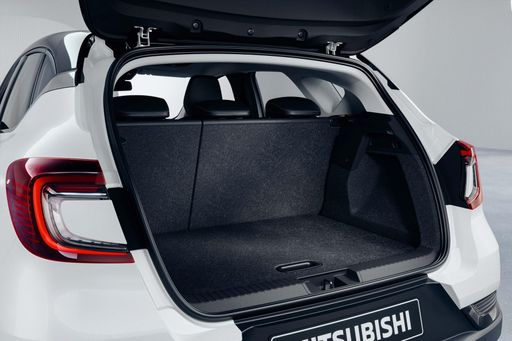 @ Mitsubishi Motors Corporation
@ Mitsubishi Motors Corporation
Renault Mégane
The Renault Mégane blends Gallic flair with practical everyday charm, showing that sensible transport can still have personality and poise. It’s a smart pick for buyers who want a comfortable, stylish hatchback that feels a little more special than the usual commute companion.
details @ Renault Group Media
@ Renault Group Media
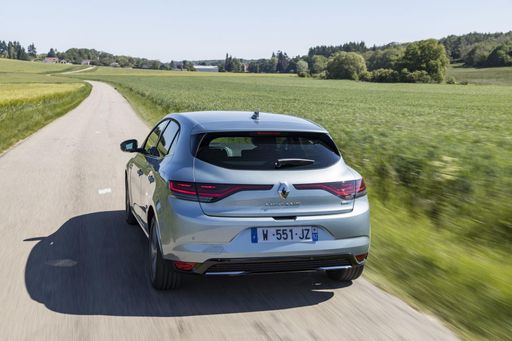 @ Renault Group Media
@ Renault Group Media
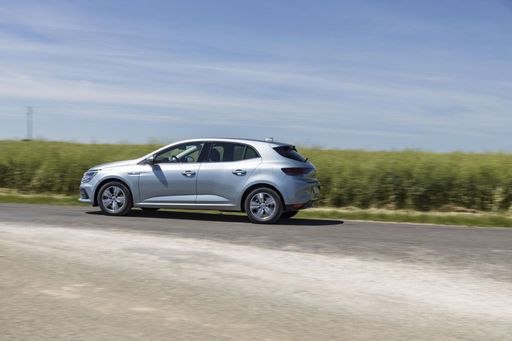 @ Renault Group Media
@ Renault Group Media
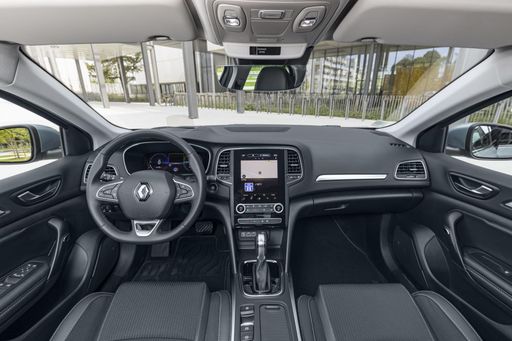 @ Renault Group Media
@ Renault Group Media
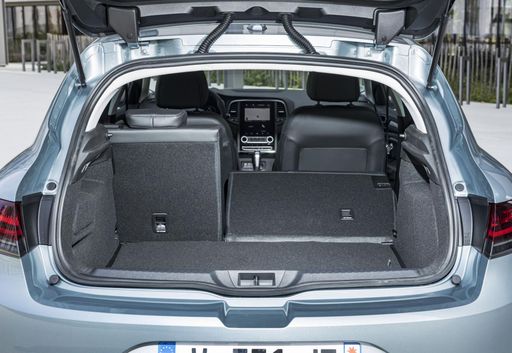 @ Renault Group Media
@ Renault Group Media
 @ Mitsubishi Motors Corporation
@ Mitsubishi Motors Corporation
|
 @ Renault Group Media
@ Renault Group Media
|
|
|
|
Costs and Consumption |
|
|---|---|
|
Price
20600 - 32500 £
|
Price
35100 - 38500 £
|
|
Consumption L/100km
4.4 - 6 L
|
Consumption L/100km
-
|
|
Consumption kWh/100km
-
|
Consumption kWh/100km
15.40 kWh
|
|
Electric Range
-
|
Electric Range
452 km
|
|
Battery Capacity
-
|
Battery Capacity
-
|
|
co2
99 - 135 g/km
|
co2
0 g/km
|
|
Fuel tank capacity
48 L
|
Fuel tank capacity
-
|
Dimensions and Body |
|
|---|---|
|
Body Type
SUV
|
Body Type
SUV
|
|
Seats
5
|
Seats
5
|
|
Doors
5
|
Doors
5
|
|
Curb weight
1296 - 1493 kg
|
Curb weight
1719 kg
|
|
Trunk capacity
348 - 484 L
|
Trunk capacity
389 L
|
|
Length
4239 mm
|
Length
4200 mm
|
|
Width
1797 mm
|
Width
1783 mm
|
|
Height
1575 mm
|
Height
1505 mm
|
|
Max trunk capacity
1458 - 1596 L
|
Max trunk capacity
1332 L
|
|
Payload
397 - 449 kg
|
Payload
446 kg
|
Engine and Performance |
|
|---|---|
|
Engine Type
Petrol, Petrol MHEV, Full Hybrid
|
Engine Type
Electric
|
|
Transmission
Manuel, Automatic
|
Transmission
Automatic
|
|
Transmission Detail
Manual Gearbox, Dual-Clutch Automatic, Automatic Gearbox
|
Transmission Detail
Reduction Gearbox
|
|
Drive Type
Front-Wheel Drive
|
Drive Type
Front-Wheel Drive
|
|
Power HP
91 - 158 HP
|
Power HP
218 HP
|
|
Acceleration 0-100km/h
8.5 - 14 s
|
Acceleration 0-100km/h
7.40 s
|
|
Max Speed
168 - 180 km/h
|
Max Speed
160 km/h
|
|
Torque
160 - 270 Nm
|
Torque
300 Nm
|
|
Number of Cylinders
3 - 4
|
Number of Cylinders
-
|
|
Power kW
67 - 116 kW
|
Power kW
160 kW
|
|
Engine capacity
999 - 1789 cm3
|
Engine capacity
-
|
General |
|
|---|---|
|
Model Year
2024 - 2025
|
Model Year
2025
|
|
CO2 Efficiency Class
D, C
|
CO2 Efficiency Class
A
|
|
Brand
Mitsubishi
|
Brand
Renault
|
What drive types are available for the Mitsubishi ASX?
Available configurations include Front-Wheel Drive.
The prices and data displayed are estimates based on German list prices and may vary by country. This information is not legally binding.
